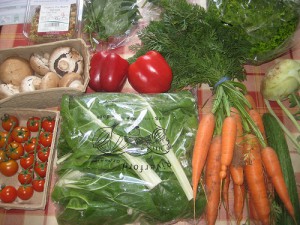 I used to be a strong believer of organics, until I saw the prices of organic foods at my local Jusco. Needless to say, I stopped believing in organics pretty quickly. Of course, I understand the premise, which is that organic food is 100% natural, without added chemicals or fertilizers, no herbicides or pesticides leaving your food 100% wholesome. There is strong justification for this, although limited scientific proof.
I used to be a strong believer of organics, until I saw the prices of organic foods at my local Jusco. Needless to say, I stopped believing in organics pretty quickly. Of course, I understand the premise, which is that organic food is 100% natural, without added chemicals or fertilizers, no herbicides or pesticides leaving your food 100% wholesome. There is strong justification for this, although limited scientific proof.
The way to think about organic is that, mankind evolved to consume certain types of food and nutrition, but with the advent of ‘industrialized agriculture’ things changed. We now consume tomatoes all year round, although it’s a seasonal fruit, the concept is simple–pluck the tomatoes when they’re ripe and then spray them with chemicals just before they hit supermarket shelves, that way nobody needs to worry about seasons. This is true for nearly all your seasonal fruits that appear ‘all year round’. All this makes the fruit un-natural or at least–less nutritious than it’s purely organic counterpart.
Here’s another way to think of organics, a less positive way. You can’t feed the world on organics. It’s painful to admit, that the advent of industrial agriculture actually helped save lives by providing far more food than organics. There’s 2 reasons why your organic food is so expensive.
The first reason is that organic certification takes a long time. In some cases, top soil needs to be removed and organic farming needs to be on-going on a particular farm for at least 4 years before a farm can be certified ‘organic’. Meaning Farmers need to switch to much lower yield organic farming for 4 years, before they can charge premium prices for their certified organic produce. So when they do start charging they incorporate 4 years of losses onto their prices.
The second reason for the price premium, is that organic farming produces far less yields than conventional farming. Meaning that an acre of organic farming produces far less food than an acre of conventional farming. This obviously drives up the price. Yet it explains why you can’t feed the world on organics. By some estimates, you’d need to clear out an area the size of South America to feed the worlds population on organics, which means you need to clear out rainforest and jungles before you can feed the world on organics, which also means organics aren’t as environmentally friendly as they initially seem, because conventional farming (while still using pesticides and herbicides) requires less land to produce the same yield as organic farming, this pushes down demand to cultivate rain-forest or jungles, leaving these majestic lands untouched.
Now some parents insist their children eat organics, although this could make them painfully allergic to the chemicals they rest of the world continues to consume (or shall I say the rest of us ‘ordinary’ folks). Some people choose organics for the status it brings, others due to health and environmental reasons.
But for the life of me, I can’t imagine why you’d want even an attacker to be sprayed with organic pepper spray. I would think pepper spray would be the one thing you’d be fine to get from a pepper farm located between a Chinese Lead mine and leaking nuclear reactor.
Why in the world would you pay an organic premium for pepper spray aimed at an enemy? Some people really have too much money. Sounds bizzare, but it’s true and for just Rm28 you too can get Organic pepper spray from this Groupon Link. Act fast.
Photo or Organic produce courtesy of : http://www.flickr.com/photos/aroberts/5894911119/sizes/m/in/photostream/
